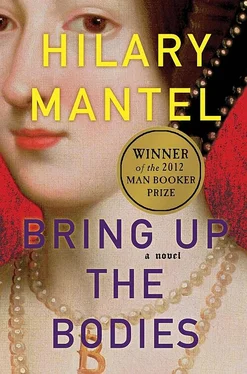The substance of the case is the work of an hour or two, but when there are ninety-five names to be verified, of the justices and the peers, then the mere shuffling and the throat-clearing, the nose-blowing, the adjustment of robes and the settling of belt sashes – all those distracting rituals that some men need before they speak in public – with all that, it is clear the day will wear on; the queen herself is a still presence, listening intently from her chair as the list of her crimes is read out, the dizzying catalogue of times, dates, places, of men, their members, their tongues: into the mouth, out of the mouth, into divers crannies of the body, at Hampton Court and Richmond Palace, at Greenwich and Westminster, in Middlesex and in Kent; and then the loose words and taunts, the jealous quarrels and twisted intentions, the declaration, by the queen, that when her husband is dead, she will choose some one of them to be her husband, but she cannot yet say which. ‘Did you say that?’ She shakes her head. ‘You must answer aloud.’
Icy little voice: ‘No.’
It is all she will say, no, no and no: and once she answers ‘Yes,’ when she is asked if she has given money to Weston, and she hesitates and admits it; and there is a whoop from the crowd, and Norfolk stops proceedings and threatens he will have them all arrested if they do not keep silence. In any well-ordered country, Suffolk said yesterday, the trial of a noblewoman would be conducted in seemly privacy; he had rolled his eyes and said, but my lord, this is England.
Norfolk has obtained quiet, a rustling calm punctuated by coughs and whispers; he is ready for the prosecution to resume, and says, ‘Very well, go on, er – you.’ Not for the first time, he is baffled by having to speak to a common man, who is not an ostler or a carter, but a minister of the king: the Lord Chancellor leans forward and whispers, reminding him perhaps that the prosecutor is Master of the Rolls. ‘Carry on, Your Mastership,’ he says, more politely. ‘Please do proceed.’
She denies treason, there is the point: she never raises her voice, but she disdains to enlarge, to excuse, extenuate: to mitigate. And there is no one to do it for her. He remembers what Wyatt’s old father had once told him, how a dying lioness can maul you, flash out with her claw and scar you for life. But he feels no threat, no tension, nothing at all. He is a good speaker, known for eloquence, style and audibility, but today he has no interest in whether he is heard, not beyond the judges, the accused, as whatever the populace hear they will misconstrue: and so his voice seems to fade to a drowsy murmur in the room, the voice of a country priest droning through his prayers, no louder than a fly buzzing in a corner, knocking against glass; out of the corner of his eye he sees the Attorney General stifle a yawn, and he thinks, I have done what I thought I could never achieve, I have taken adultery, incest, conspiracy and treason, and I have made them routine. We do not need any false excitement. After all, it is a law court, not the Roman circus.
The verdicts drag in: it is a lengthy business; the court implores brevity, no speeches please, one word will suffice: ninety-five vote guilty, and not one nay-sayer. When Norfolk begins to read the sentence, the roar rises again, and one can feel the pressure of the people outside trying to get in, so it seems the hall gently rocks, like a boat at its mooring. ‘Her own uncle!’ someone wails, and the duke bangs his fist on his table and says he will do slaughter. That produces some quiet; the hush allows him to conclude, ‘…thy judgement is this: Thou shalt be burned here, within the Tower, or else to have thy head smitten off, as the king’s pleasure shall be further known –’
There is a yelp from one of the justices. The man is leaning forward, whispering furiously; Norfolk looks irate; the lawyers are going into a huddle, the peers crane forward to find out what is the delay. He strolls over. Norfolk says, ‘These fellows tell me I have not done it right, I cannot say burning or beheading, I have to say one, and they say it must be burning, that is how a woman suffers when she is a traitor.’
‘My lord Norfolk has his instructions from the king.’ He means to crush objection and he does. ‘The phrasing is the king’s pleasure and moreover, do not tell me what can be done and what cannot, we have never tried a queen before.’
‘We’re just making it up as we go,’ says the Lord Chancellor amiably.
‘Finish what you were saying,’ he tells Norfolk. He steps back.
‘I think I have done,’ Norfolk says, scratching his nose. ‘…head smitten off, as the king’s pleasure shall be further known of the same.’
The duke drops his voice and concludes at conversational pitch; so the queen never hears the end of her sentence. She has the gist, though. He watches her rise from her chair, still composed, and he thinks, she doesn’t believe it; why doesn’t she believe it? He looks across to where Francis Bryan was hovering, but the messenger has already gone.
Rochford’s trial has now to go forward; they must get Anne out, before her brother comes in. The solemnity of the occasion has dissipated. The more elderly members of the court have to totter out to piss, and the younger to stretch their legs and have a gossip, and collect the latest odds on an acquittal for George. The betting runs in his favour, though his face, as he is brought in, shows he is not deceived. To those who insist he will be acquitted, he, Cromwell has said, ‘If Lord Rochford can satisfy the court, he will be let go. Let us see what defence he will make.’
He has only one real fear: that Rochford is not vulnerable to the same pressure as the other men, because he is not leaving behind anyone he cares for. His wife has betrayed him, his father deserted him, and his uncle will preside over the court that tries him. He thinks George will speak with eloquence and spirit, and he is correct. When the charges are read to him, he asks that they be put one by one, clause by clause: ‘For what is your worldly time, gentlemen, against God’s assurance of eternity?’ There are smiles: admiration for his suavity. Boleyn addresses him, Cromwell, directly. ‘Put them to me one by one. The times, the places. I will confound you.’
But the contest is not even. He has his papers, and if it comes to it, he can lay them on the table and make his case without them; he has his trained memory, he has his accustomed self-possession, his courtroom voice that places no strain on his throat, his urbanity of manner that places no strain on his emotions; and if George thinks he will falter, reading out the details of caresses administered and received, then George does not know the place he comes from: the times, the manners, that have formed Master Secretary. Soon enough, Lord Rochford will begin to sound like a raw, tearful boy; he is fighting for his life, and thus unequal to a man who seems so indifferent to the outcome; let the court acquit if it will, there will be another court, or a process, more informal, that will end with George a broken corpse. He thinks, too, that soon young Boleyn will lose his temper, that he will show his contempt for Henry, and then it will all be up with him. He hands Rochford a paper: ‘Certain words are written here, which the queen is said to have spoken to you, and you in your turn passed them on. You need not read them aloud. Just tell the court, do you recognise those words?’
George smiles in disdain. Relishing the moment, he smirks: he takes a breath; he reads the words aloud. ‘The king cannot copulate with a woman, he has neither skill nor vigour.’
He has read it because he thinks the crowd will like it. And so they do, though the laughter is shocked, incredulous. But from his judges – and it is they who matter – there is an audible hiss of deprecation. George looks up. He throws out his hands. ‘These are not my words. I do not own them.’
Читать дальше
Конец ознакомительного отрывка
Купить книгу












